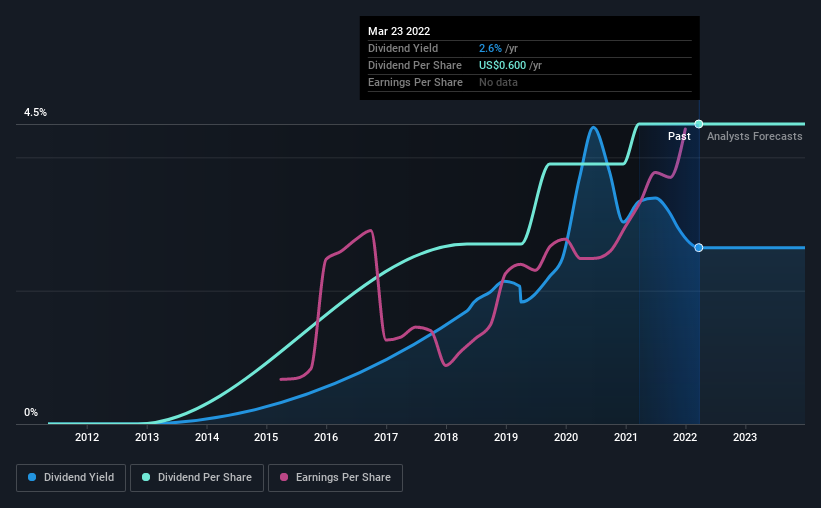First United (NASDAQ:FUNC) Has Announced A Dividend Of US$0.15
The board of First United Corporation (NASDAQ:FUNC) has announced that it will pay a dividend on the 2nd of May, with investors receiving US$0.15 per share. This means the dividend yield will be fairly typical at 2.6%.
See our latest analysis for First United
First United's Payment Has Solid Earnings Coverage
We like to see a healthy dividend yield, but that is only helpful to us if the payment can continue. However, First United's earnings easily cover the dividend. This means that most of its earnings are being retained to grow the business.
Looking forward, earnings per share is forecast to rise by 11.9% over the next year. If the dividend continues along recent trends, we estimate the payout ratio will be 23%, which is in the range that makes us comfortable with the sustainability of the dividend.
First United Is Still Building Its Track Record
The company has maintained a consistent dividend for a few years now, but we would like to see a longer track record before relying on it. The first annual payment during the last 4 years was US$0.36 in 2018, and the most recent fiscal year payment was US$0.60. This means that it has been growing its distributions at 14% per annum over that time. The dividend has been growing rapidly, however with such a short payment history we can't know for sure if payment can continue to grow over the long term, so caution may be warranted.
The Dividend Looks Likely To Grow
Investors could be attracted to the stock based on the quality of its payment history. We are encouraged to see that First United has grown earnings per share at 29% per year over the past five years. Earnings per share is growing at a solid clip, and the payout ratio is low which we think is an ideal combination in a dividend stock as the company can quite easily raise the dividend in the future.
First United Looks Like A Great Dividend Stock
Overall, we like to see the dividend staying consistent, and we think First United might even raise payments in the future. Earnings are easily covering distributions, and the company is generating plenty of cash. All of these factors considered, we think this has solid potential as a dividend stock.
Companies possessing a stable dividend policy will likely enjoy greater investor interest than those suffering from a more inconsistent approach. At the same time, there are other factors our readers should be conscious of before pouring capital into a stock. For instance, we've picked out 1 warning sign for First United that investors should take into consideration. Looking for more high-yielding dividend ideas? Try our collection of strong dividend payers.
Have feedback on this article? Concerned about the content? Get in touch with us directly. Alternatively, email editorial-team (at) simplywallst.com.
This article by Simply Wall St is general in nature. We provide commentary based on historical data and analyst forecasts only using an unbiased methodology and our articles are not intended to be financial advice. It does not constitute a recommendation to buy or sell any stock, and does not take account of your objectives, or your financial situation. We aim to bring you long-term focused analysis driven by fundamental data. Note that our analysis may not factor in the latest price-sensitive company announcements or qualitative material. Simply Wall St has no position in any stocks mentioned.

 Yahoo Finance
Yahoo Finance 
